Thursday at Metro, councilors are sure to get an earful when they host a public hearing on the contentious Columbia River Crossing project. The topic will be Resolution No. 09-4023, which Metro describes as:
“For the Purpose of Expressing a Sense of The Council on the Number of Lanes Proposed as part of the Columbia River Crossing Project, taking into Account Congestion Pricing, Capacity, and possible Induced Demand Effects.”
The debate on the issues listed above has grown louder in recent days. After The Oregonian published an editorial in support of a 12-lane-bridge (and in support of Commisioner Randy Leonard) a few days ago, they published a retort by Metro Council President David Bragdon (in their online opinion section).
In recent days, City Commissioner Randy Leonard has engaged some heated back-and-forth with a who’s-who of bridge critics on the email list of the Smarter Bridge coalition.
The Smarter Bridge group wants Leonard to support an independent analysis of the projections and assumptions being used by the CRC staff and the DOTs from both sides of the river to justify a 12-lane bridge.
At last week’s City Council hearing on the CRC, commissioners listened to the opinions of over 70 Portlanders, including some pointed testimony against the 12-lane bridge option from the Bicycle Transportation Alliance.
If you’re brushing up on what the rest of Metro Council thinks about the CRC, you might want to re-read an interview with Councilor Rex Burkholder we published back in December. And, if you’re counting votes on the 7-member Metro Council, you should know that Councilors Robert Liberty and Carl Hosticka are the only two elected officials who have voted against the project so far.
Here are the details for the Metro hearing:
- Metro Council Meeting (with public hearing on the CRC)
Thursday, February 5, 2009
2:00 pm to 4:30 pm
Council Chambers (600 NE Grand Ave.)
More info, meeting packet downloads, and more at OregonMetro.gov



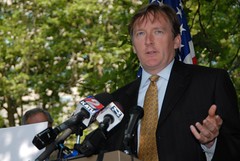
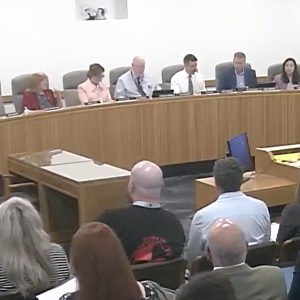
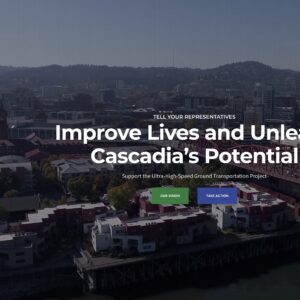
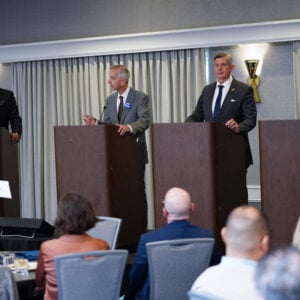
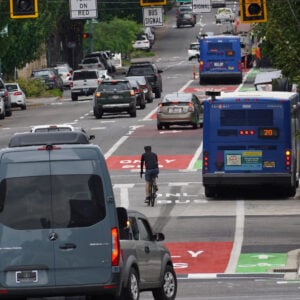
Thanks for reading.
BikePortland has served this community with independent community journalism since 2005. We rely on subscriptions from readers like you to survive. Your financial support is vital in keeping this valuable resource alive and well.
Please subscribe today to strengthen and expand our work.
I hope that many people will have signs at this event and also call or write the Metro councilors.
When I first read the title, I thought it said “Now it’s Metro’s turn to hear CRC lame debate”. And it really is a lame debate – we don’t need the 12-lane bridge, it’s only going to induce more demand, and that’s presuming the funding climate exists to complete it.
CRC-12 is a boondoggle – the West coast’s version of Boston’s Big Dig.
Matt-
I hope you have time to take that sentiment to the hearing with a sign:
“CRC = Our Very Own version of Boston’s Big Dig. Wonderful!”
It’s really, really important that lots of people show up at Metro and demand an independent review of the project’s assumptions, as Bragdon suggested in his recent op ed piece:
http://www.oregonlive.com/opinion/index.ssf/2009/02/bridge_analysis_goes_in_a_circ.html
Unfortunately I can’t come; I’m out of town. But I hope lots of BikePortland readers will show up and insist on an independent review.
Actually, in many ways, the Big Dig made more sense than this piece of c__p bridge. It tried to address the neighborhood-killing aspects of high volume roadways, and by burying parts of the network, returned much street surface to the people – as opposed to cars – of Boston. The CRC does nothing of the kind.
My big question to any elected official in Portland who would support the CRC12 is: Why is the so-called greenest city in the US still building out its car-based infrastructure?
Doesn’t anyone realize that a bigger Interstate bridge feeding I-5 southbound will be like filling a quart jar with a 5 gallon funnel? This will allow the Rose Quarter to back traffic up to at least SR500.
I want:
$4 minimum toll on the I-5 bridge (on WA side)
$4 minimum toll on the 205 bridge (on WA side)
MAX to cross the river
Bike/ Ped Bridge that is Kid/ elderly friendly (Wide and not too steep)
and most important: KEEP IT ONLY 6 LANES!
Why isn’t it 2 lanes? Well, roads used to be 2 lanes, but they got congested with too many cars, so roads became 4 lanes to ease the congestion, but then we had many more drivers take to the new wider roads which meant more car trips that were longer distances so we filled the 4 lanes with congestion which meant we had to build roads that had 6 lanes, but then those lanes filled up with congestion because more and more drivers took to the roads and took longer and longer trips…
If we add more lanes, we will get more drivers with more trips that are further out yet.
If you don’t believe me, look at any city in the world with 8, 10, 12 lanes (LA, Dallas, Atlanta, ETC) Rush hour traffic in those cities are MUCH WORSE than Portland where we keep it local, and have livable neighborhoods where goods and services are walkable/ bikeable from most places. Bigger bridges and bigger highways mean Box Stores further out. NO MORE LANES.
NO MORE LANES!
A couple of phrases come to mind:
ie:
If you build it they will come…
The weight of the load expands to fit the space available…
When you build capacity into a system, history has shown time and time again, that demand will exceed it. If you build this, sprawl will take over, and then you’re going to get all of the negative impacts that go with that.
We need to focus on how to prevent sprawl.
Bigger is in this case NOT better.
I gave testimony at this hearing today – second testimony in a week! I’m concerned I might become a serial testifier, showing up just to rant…
FWIW, I’ve posted the full text below. (Sorry for another in a series of super-long comments.)
Many thanks again to Amanda Fritz for posting a link to her tips on testifying; it was very helpful.
—
Council president and members of council,
I’m here to ask that you devote more independent study to the question of how much induced demand the big-bridge option is likely to create.
The prediction that a bigger bridge will induce demand probably seems obvious to anyone who’s ever moved from a small apartment into a bigger house. When you do, at first you’re amazed by the amount of space you have, and then eventually – almost inevitably – the place fills up. And it stays filled up until you move into a bigger house, and then that place fills up.
This can go on forever until you either run out of money, or you exercise some self-discipline. It seems like, in the case of this bridge, that we could do both of those things.
The bridge is already projected to cost a huge amount of money, it’s not clear where that money is going to come from, or what other projects will suffer as a result. And projects like this bridge are notorious for going over budget.
As for discipline, that comes in in the form of congestion pricing which is supposed to take care of excessive demand. But I have to wonder, if tolling is the one tool we’re allowed to use to reduce congestion on this crossing, why aren’t we using it now?
Just in saying that, I can imagine the pain the mere thought of starting tolling now causes in people who have to use this bridge every day. I imagine tolling the bridge now would cause a huge uproar. In the face of such an uproar, I could imagine the political will to toll faltering.
Which makes me wonder: once congestion pricing is in place on a new bridge, will the discipline always be there to keep it in place?
Imagine some future economic crisis, worse even than the one we’re in now. Maybe at some point the tolls are removed as an economic stimulant. Once they’re off, so are your congestion controls. Getting them back on again would be as difficult as it would be to enact congestion controls on the bridge today.
Perhaps a better approach – one that might literally place more concrete limits on over-expansion – would be to start the conversation off with the question: how few lanes could we get away with? We could look up and down I-5 and see how many lanes are needed elsewhere in this region, and ask why we need the extra in this one spot. And we could look to where else on I-5 you see this many lanes, and ask: do we really want to be like those places?
Maybe we could get by with fewer lanes on the main bridge if we went with auxiliary bridges in various places. Like maybe a small, local bridge to Hayden Island.
A more visionary approach would be to find ways that people could live without having to travel vast distances by car, and especially not over huge, crowded, interstate highway choke points. Ways like helping jobs and small businesses to thrive on a local level.
So again, I ask that you:
* Get more, independent perspectives on the potential for induced demand
* Not get locked down into the finality implied by this premature decision on number of lanes, and
* That you lean toward the disciplined approach of fewer lanes.
Thank you for hearing my testimony.
I thought I’d follow Spencer’s lead and post my testimony, too. I left after testifying, but according to the Coalition for a Livable Future’s Mara Gross, Metro voted unanimously on an amendment to recommend a “comprehensive demand management analysis by an independent consulting firm, not connected to this project or with present or potential contracts with the Washington and Oregon Departments of Transportation,” which Council President Bragdon called the first ever unanimous Metro vote on a CRC issue.
————————————
Hi. My name’s Joel Batterman. I’m here to represent the Cascade Climate Network, a regional organization of Oregon and Washington youth. Our statement of principles, the Cascade Climate Declaration, has been signed by the student governments of Northwest colleges and universities representing a total of over 125,000 students. The Declaration calls us to confront global warming and secure a sustainable, just, and prosperous future for all.
We testified before you on this project last summer, and there still can be no doubt that every additional lane we build on this bridge takes us farther away from these goals. No matter how much windmill dressing we add, each additional lane brings more global warming pollution. Each additional lane brings more dependence on oil, directing more of our money away from local businesses and sending it out of the region’s economy to subsidize the indoor ski slopes of Dubai.
There’s been considerable discussion of the multimodal elements of this project, elements which have been claimed to resolve the problem of induced demand. Not too long ago I read a number of articles discussing how the highway project at issue was a national model of innovation in how such projects could be planned, and how the incorporation of high-capacity transit, bicycle paths, and other green elements would reduce its environmental impact. The articles were written in the early 1970s. The project under discussion was the Mt. Hood Freeway. Obviously, these multimodal elements are welcome, but now as then, they should not be allowed to distract from the primary attributes of the project.
We urge you to make no decision on the number of lanes until you’ve received the independent analysis you requested. Patience can’t be faulted when the stakes are this high. And as you consider your choice, remember that its consequences will extend beyond the horizon of all our lifetimes. A number of people have spoken, in testimony and in print, about a need to build the bridge big for future generations. I guess I can’t speak for future generations, but at twenty years old, I do feel a certain amount of kinship with them. And I don’t believe a 12-lane bridge is the future my generation wants.
You have the power to shape the future that we do want, a future that works better for everyone, no matter what side of the river we’re on. Please, as you consider this project, remember us. We’ll remember you.
Thank you.
I’m sorry; I meant to write that Metro voted unanimously to -support- the amendment recommending an independent analysis.
Joel,
Thanks for posting your testimony! It’s really well done. I missed bits and pieces at the time, so it’s good to be able to read it here.
At the time I did catch the phrase “windmill dressing,” which I thought was hilarious. I pretty much didn’t take any notes at the session other than those two words. 🙂
I wonder if we might try to compile the most effective CRC testimony – or at least the high points – in one place online. Offhand, I remember Michelle Poyourow’s was good, the fellow after Michelle was entertaining and made some good points, and Ron Buel’s statements are always well-informed.
Which reminds me, it was good to see the council have an extended back-and-forth with Mr. Buel. They seemed genuinely interested in what he had to say; to the point that they had to keep dragging him back when he kept jumping up to leave!
Steve G (#3) – I wish I’d been able to, but I work in Hillsboro now, and with my commute it’s very difficult to get to meetings which take place during the business day. (especially since I’ve only been at the new job for 2 months)
I really hope that somone took the initiative and threw that particular comment out to the Metro Council in testimony – we don’t need our own version of the Big Dig.
I was surprised (but not shocked) to see an opinion piece by Mayor Adams in the Oregonian today supporting a 12-lane bridge solution:
http://www.oregonlive.com/opinion/index.ssf/2009/02/the_way_forward_across_the_riv.html
Actually, when I first read the piece it wasn’t clear to me what size bridge was being supported but another piece in the Oregonian cleared things up:
http://www.oregonlive.com/business/index.ssf/2009/02/mayors_support_jumbo_bridge.html
Is anyone going to the Council meeting today on this? I have to say that what is on the Council agenda at present and what is outlined in these articles don’t quite jibe. This is the resolution on the Council agenda for 3 pm:
http://www.portlandonline.com/auditor/index.cfm?c=26997&a=231751
Anyone have any insight on what exactly is going on and what will be discussed and perhaps decided on today by City Council?
I mean, is this it? Is a 12 lane CRC in our future?
Ciao!
Tony